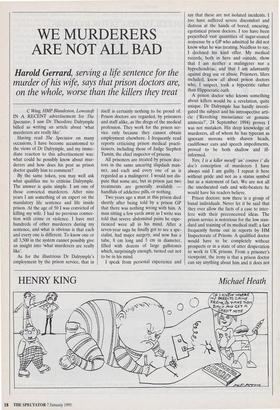WE MURDERERS ARE NOT ALL BAD
Harold Gerrard, serving a life sentence for the
murder of his wife, says that prison doctors are, on the whole, worse than the killers they treat
C Wing, HMP Blundeston, Lowestoft IN A RECENT advertisement for The Spectator, I saw Dr Theodore Dalrymple billed as writing an article about 'what murderers are really like'.
Having read The Spectator on many occasions, I have become accustomed to the views of Dr Dalrymple, and my imme- diate reaction to this advertisement was: what could he possibly know about mur- derers and how does his post as prison doctor qualify him to comment?
By the same token, you may well ask what qualifies me to criticise Dalrymple. The answer is quite simple. I am one of those convicted murderers. After nine years I am something of an expert on the mandatory life sentence and life inside prison. At the age of 50 I was convicted of killing my wife. I had no previous connec- tion with crime or violence. I have met hundreds of other murderers during my sentence, and what is obvious is that each and every one is different. To know one or all 3,500 in the system cannot possibly give an insight into 'what murderers are really like'.
As for the illustrious Dr Dalrymple's employment by the prison service, that in itself is certainly nothing to be proud of. Prison doctors are regarded, by prisoners and staff alike, as the dregs of the medical profession. They work for the prison ser- vice only because they cannot obtain employment elsewhere. I frequently read reports criticising prison medical practi- tioners, including those of Judge Stephen Tumin, the chief inspector of prisons.
All prisoners are treated by prison doc- tors in the same uncaring slapdash man- ner, and each and every one of us is regarded as a malingerer. I would not dis- pute that some are, but in prison just two treatments are generally available handfuls of addictive pills, or nothing.
Two years ago a man at this prison died shortly after being told by a prison GP that there was nothing wrong with him. A man sitting a few yards away as I write was told that severe abdominal pains he expe- rienced were all in his mind. After a seven-year saga he finally got to see a spe- cialist, had major surgery, and now has a tube, 8 cm long and 3 cm in diameter, filled with dozens of large gallstones which, surprisingly enough, turned out not to be in his mind.
I speak from personal experience and say that these are not isolated incidents. I too have suffered severe discomfort and distress at the hands of bored, uncaring, egotistical prison doctors. I too have been prescribed vast quantities of sugar-coated nonsense by a GP who admitted he did not know what he was treating. Needless to say, I declined his kind offer. My medical records, both in here and outside, show that I am neither a malingerer nor a hypochondriac, and that I am adamantly against drug use or abuse. Prisoners, lifers included, know all about prison doctors who, I suspect, took a hypocritic rather than Hippocratic oath.
A prison doctor who knows something about killers would be a revelation, quite unique. Dr Dalrymple has hardly investi- gated the subject and his introspective arti- cle (`Revolting insouciance or genuine amnesia?', 24 September 1994) proves I was not mistaken. His deep knowledge of murderers, all of whom he has typecast as ignorant morons with shaven heads, cauliflower ears and speech impediments, proved to be both shallow and ill- informed.
Yers, I is a killer rneself 'an' contree t' dis doe's conception of murderers I have always said I am guilty. I repeat it here without pride and not as a status symbol but as a statement of fact. We are not all the uneducated oafs and wife-beaters he would have his readers believe.
Prison doctors: now there is a group of banal individuals. Never let it be said that they ever allow the facts of a case to inter- fere with their preconceived ideas. The prison service is notorious for the low stan- dard and training of its medical staff: a fact frequently borne out in reports by HM Inspectorate of Prisons. A qualified doctor would have to be completely without prospects or in a state of utter desperation to work in UK prisons. From a prisoner's viewpoint, the irony is that a prison doctor can say anything about him and it does not have to be true. It goes down on his record, fictional or not, and is impossible to remove. As we never get sight of medi- cal records, it could be years before such unsubstantiated comments come to light. Upset a prison doctor and you have a dan- gerous enemy.
On the question of murderers' remorse, about which Dr Dalrymple is so cynical, I would like to know what accurate scientific measurement he applies to calculate the correct degree displayed by an individual and is it metric or imperial? Are we sup- posed to drop our eyes and produce suffi- cient fluid from our ducts to meet his approval? What does he know of the tears shed by those locked up in lonely cells over indeterminate years? Capital punishment was abolished as being barbaric, but are these years of incarceration any more humane than a stout piece of rope? Sor- row, remorse, regret, compassion for our victims, takes place in privacy and solitude. Tears cannot be called up to order in a once-yearly interview with an uninterested GP. There is no lightheartedness about violent death, and as for amnesiacs of con- venience the majority of us do not forget, not ever, not for a single moment. Naturally, there are exceptions, the ones who claim innocence, who show no remorse. These are the con men, the play actors, who can turn it on and off at the drop of a hat, winking over the shoulders of eager, gullible shrinks, who claim a successful cure. These are the smarties doctors release, who invariably kill again.
Dr Dalrymple admits he may be wrong. How grand of him to admit that so few lif- ers actually kill again. Does he know the Home Office statistic? While other offenders, drug addicts, recidivists, child molesters and rapists run at a high 40 to 60 per cent, life prisoners have a recidi- vism rate of half of 1 per cent.
The next question I would ask of the learned Dr D. is, where in the prison sys- tem is this 'cultivation' and 'training' of which he sometimes speaks? In a yearly statutory visit from one of his kind? As a well-educated, intelligent human being, after nine years in the system I can honest- ly say there is no rehabilitative machinery for life prisoners. Institutionalisation is all, and it is a fact that after five years prison serves no purpose. A man begins rapidly to degenerate. Very few killers in this country have notoriety enough to compare with O.J. Simpson, with whom Dr Dalrymple com- pares us, and who, incidentally, still has to be tried and proven guilty. Whether he is or not, is not for Theodore Dalrymple or any other doctor to judge. But is O.J., or even poor old Reggie Kray, the index of what murderers are really like?
There is no positive side to murder. There is no justification for killing another human being. What I am saying is that those not qualified to do so should not set themselves up as judge and jury throughout a killer's time in custody.
The law states that a man may be tried only once for a particular homicide, but that does not prevent the likes of Dr Dal- rymple attempting to hold court. These mini-trials beyond due process of the law should cease. He has no need nor any right to remind us of our guilt. Hour by hour, day by day, we remember, and remember for the rest of our lives.
Mr Gerrard has asked that a donation to the Great Ormond Street Hospital for Sick Children be made in lieu of a fee for this article.



















































 Previous page
Previous page